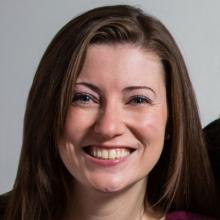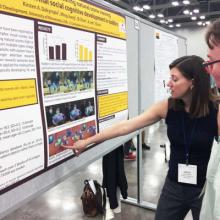Kirsten Dalrymple
What are your main responsibilities or activities in your current position?
Research, administration, student supervision, teaching undergraduate classes.
How does your current work relate to your graduate degree?
My PhD revolved around disorders of vision. I now investigate normal and abnormal visual development in children. My PhD helped teach me rigorous experimental design, critical thinking, and scientific writing. More broadly, I learned to be a good problem solver and an excellent communicator.
What do you like and what do you find challenging about your current position?
I love the multidimensional nature of my job. From semester to semester, week to week, or even day to day, my responsibilities change from administration to running experiments, to analysing data, to writing up papers, teaching, supervising students, attending and presenting at conferences.
Is your current career path as you originally intended?
I have always wanted to be a scientist. During my PhD and Postdoc I strived for a tenure track faculty position. I think that this is even better than I could have hoped for because I have a perfect work-life balance working for a Principal Investigator in a successful lab in my field.
What motivated you to pursue graduate work at UBC?
The fit between myself and my supervisors both in terms of research interests and personality.
What did you enjoy the most about your time as a graduate student at UBC?
I worked very hard 11 months of the year and then had the flexibility in my schedule to travel for 3-4 weeks each year. This helped me grow personally as well as professionally.
What key things did you do, or what attitudes or approaches did you have, that contributed to your success?
A graduate degree is a highly self-motivated endeavor. You need to be disciplined and have the intellectual drive and curiosity to successfully complete a program.
What is your best piece of advice for current graduate students preparing for their future careers?
Take your time to learn. You may feel pressure to finish your degree, but this is the only time that you'll have this type of freedom to learn and grow.
Did you have any breaks in your education?
I did not have any breaks in my education, but I made sure to have a month or two off between degrees to recharge my batteries.
How did you find out about/obtain your current position?
From my PhD at UBC I got a Postdoctoral Fellowship at Dartmouth College in Hanover, New Hampshire. This opportunity came about through a connection between my PhD supervisor and a professional colleague at Dartmouth. From there, I applied for Canadian funding (Banting) to extend my work and bring it to the Institute of Child Development at the University of Minnesota. I was awarded the Banting and completed a second Postdoctoral Fellowship at the University of Minnesota. I loved the lab I was working in and the city, so I asked my supervisor if I could stay on as a staff scientist. The rest is history.
What challenges did you face in your graduate degree, or in launching your career?
Graduate school can be stressful, and, at times, isolating. I found it challenging to keep working at times, particularly when experiments weren't going well, or manuscripts were rejected. I did learn from these experiences and am a much stronger person as a result. I recommend counseling, and other social support when needed. You'd be surprised how many of your colleagues are going through the same challenges.
How are jobs normally posted and filled in your organization or industry?
Personal connections, advertisements on academic webpages.

